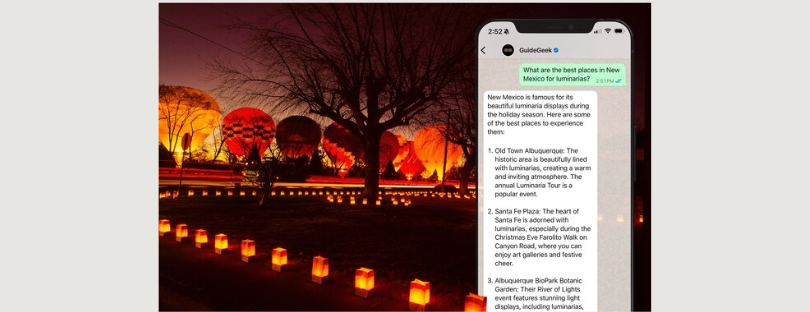
Smart Hotel Rooms Boost Guest Loyalty Programs
A smart hotel room is a room that makes use of ‘smart’ electronic devices, powered by the Internet of Things (IoT). This IoT technology means that what were once ordinary devices are now fitted with internet connectivity, allowing them to send and receive data and, effectively, communicate with one another.
Devices with internet connectivity and communication capabilities can communicate with one another and use the internet to find information. A smart speaker might be used to control several devices, for instance, or a single hub could be used to monitor device performance.
Travelers looking for places to stay that go above and beyond just providing a place to sleep are likely to choose hotels offering personalized experiences. The advent of voice AI technology presents a unique opportunity for hoteliers to reduce friction and provide the highly personalized experiences consumers are starting to expect.
Implementing a custom, branded voice assistant allows hotel operators to have control over the experience and the resulting data, allowing them to move beyond simply placing a smart speaker in a room to providing personalization, convenience, and a wider range of services than previously possible, Sound Hound reports. In fact, voice AI solutions for the hospitality industry have evolved to deliver voice-enabled experiences that begin before the guest reaches the hotel and continue during every aspect of their stay, including:
Voice AI concierge services
Front desk assistance
Employee assistance
In-room device operations
Tomorrow’s smart hotels will allow guests to make and change reservations, check in and check-out, order room service and housekeeping, make reservations, order movies and listen to music, adjust in-room controls such as lights, drapes, and thermostats, and get tickets to local experiences through a single voice assistant on multiple platforms.
The importance of voice technology for helping hotels offer memorable experiences that build loyalty is not lost on the majority of hotel operators, according to the Oracle Hotels Study, in fact, 78% said voice-activated controls for lights, air conditioning, and room devices would be mainstream on in mass adoption by 2025. Other top uses include guest recognition and ordering room and hotel services.
While the trends and predictions all point to voice tech as redefining the future of hotel experiences, brands are still trying to figure out how to get the most out of voice assistants. If implemented intelligently, custom-branded voice assistants can become the vehicles by which you turn faltering loyalty programs into valuable memberships for your guests — encouraging them to come back time and again.
Sound Hound’ve outlined three ways to use voice technology to deepen the connection with your existing loyalty members and find new ones:
Greater personalization with voice AI
Extend the travel experience with voice
Elevate loyalty member experiences
1. Greater personalization through voice AI smart hotel
In the near future, smart hoteliers will find ways to leverage the functionality of a virtual concierge for loyalty members. By combining preferences stated in loyalty profiles with data collected during each stay, hotels will be able to anticipate guests’ needs in a way that was not possible without voice AI.
“By 2025, the virtual concierge will become standard. Syncing guests’ current and previous stay records will enable hotels to offer virtual assistants that, for example, deliver breakfast to the rooms of guests with early-morning departures.” Hospitality in the Digital Era report by Cognizant
In combination with other technologies, such as text and email, the customized guest experience can begin before the person even checks into the room. Upon arrival at the hotel, facial recognition, mobile apps or virtual key check-ins can reduce the friction of today’s lobby experiences.
According to Oracle’s study, more than a third of hotel guests stated that they would stay more at a hotel that offered voice-activated controls for lights, air conditioning, and room devices, and even more would be loyal to a hotel that offered voice-activated orders for room service.
Once in the room, a voice assistant can greet the guest by name and offer to set the room temperature, lighting, and entertainment settings to match the experience of the last stay. Beyond controlling the environment, an in-room voice assistant will further create a tailored experience by automatically speaking in the guest’s native language and offering notifications of amenities previously enjoyed by the guest.
More than a third of hotel guests stated that they would stay more at a hotel that offered voice-activated controls for lights, air conditioning, and room devices, and even more, would be loyal to a hotel that offered voice-activated orders for room service., Oracle
For example, guests may be greeted by such prompts as:
“You normally like to visit the gym during your stay. It is located on the third floor and is open between the hours of 6 am and 11 pm.”
“Would you like additional towels delivered today?”
“We have placed hypo-allergenic pillows on your bed. Feather pillows are available in the closet.”
Letting your loyalty members know that you understand them and remember their preferences will create experiences at your properties that are not available at other hotels.
2. Extending the travel experience with voice smart hotel
Trends in travel have changed in the last few years. Previously, people wanted to visit new places without changing routines or food preferences. Today, travelers are looking to experience the authentic way of life in the places they visit. Eating the food native to the area, visiting places frequented by locals, experiencing cultural events, and learning the history of the destination are examples of coveted local experiences.
Creating a seamless transition from hotel to exploration adds value to the loyalty experience. A custom voice solution provides numerous opportunities to get people out of their rooms and immersed in memorable activities.
SoundHound’s Voice AI platform’s Collective AI™ architecture allows developers to integrate new domains into the voice assistant allowing them to build upon existing functions. Our extensible platform for developer collaboration creates a global AI that is always learning and larger than the sum of its parts. Interconnected domains and knowledge graphs are crowdsourced to domain experts, and its intelligence increases exponentially based on hundreds of domains integrating content and services (with redistribution rights).
Ultimately, Sound Hound helps brands create voice assistants that will know the answer to almost any question and perform any task.
For example, to simplify getting around town and finding things to do and places to eat, hoteliers might want to add one or more of these content domain functions to their voice assistant:
AccuWeather: Local weather information and forecasts
FlightStats: Real-time worldwide flight status and airport tracking
Uber: Ride Sharing, cost estimates, and booking a ride
Wcities: Over 200M live entertainment events in over 2000 cities worldwide
Yelp: Local business information, including restaurants, ratings and more.
For loyalty members, this experience could be further elevated by remembering food allergies or preferences for types of restaurants — family-friendly, romantic, vegan etc. — and offering to locate similar experiences at every destination.
3. Elevate loyalty member experiences smart hotel
Travel is back, but it’s not what it used to be. Tech-savvy guests want frictionless experiences and will show loyalty to those properties that can simultaneously deliver personalization and privacy.
Creating greater value for loyalty members is a continuing challenge for hoteliers. Convincing guests that giving up some information and joining a loyalty program is worthwhile will only get harder as travelers can easily compare prices and book hotel rooms based on cost and location.
Hotel companies should ultimately focus on driving satisfaction and providing the best service so consumers choose their brand over others and recommend it to friends and family.
As our world becomes more digitized, the conveniences afforded through technology may become the element that differentiates travel and hotel experiences. Providing your guests with 24/7 access to their own entertainment apps, giving them access to smart home functionality, and keeping them connected to the world inside and outside the hotel using branded voice assistants is a giant step towards overcoming the greatest challenges facing the hospitality industry today.
For loyal customers, technology can be used to elevate their experiences by providing a consistent voice experience no matter which property they choose to visit. During their stays, loyalty members can receive voice reminders about next-leg reservations or notifications for check-in requirements. Arrangements can be made for in-room amenities without having to stop what they’re doing, pick up a phone, or go to the front desk.
With the promise of truly personalized experiences, consumers may wake up to the benefits of loyalty program membership. When travelers feel cared for and understood, hotels become more than just a place to sleep. They become an integral part of the travel experience.








